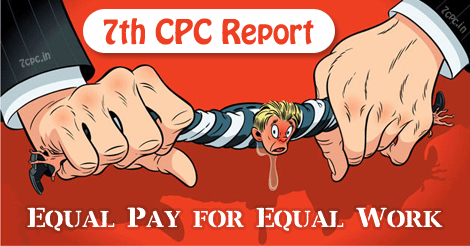Equal Pay for Equal Work – 7th CPC Report
“Equal Pay for Equal Work – Pay Matrix addresses these issues as well”


One recurrent theme in the representations of various associations relates to ‘equity’ or ‘Equal Pay for Equal Work.’
Ideally, the remuneration package should
establish horizontal equity: employees should feel that their pay is
comparable with the remuneration structure of similarly placed positions
outside their organization. The employees should also feel that the pay
structure shows linear progression pattern and thus the notion of
vertical equity is also maintained.
The Pay Matrix addresses these issues as
well. The Commission has designed the pay structure in such a manner
that the pay progression recognizes the importance of vertical
relativities and also assigns a reasonable basis to such progression.
This has been done by assigning a uniform fitment factor of 2.57.
The Commission feels that there is
strong need to create a culture of performance in government – from
establishing standards of performance, to measuring, and promoting
people based on performance. To emphasize on the culture of performance,
the Commission has recommended that all the non-performers in the
system should be phased out after 20 years.
The Commission has recommended that
Performance Related Pay should be introduced in the government and that
all Bonus payments should necessarily be linked with productivity.
The various Central Services have
contended that this edge given to the IAS and the IFS is iniquitous and
violates the principle of ‘equal pay for equal work.’
They have pointed out that the Civil
Services Examination (CSE) conducted by the UPSC is an examination
that is common for recruitment to around 18 Group `A’ Services and that
the choice of Service exercised by the candidates is based upon very
many factors. It is not necessary that only the top-most go to the IAS.
It has also been pointed out that officers of most of the Services are,
in their early years, posted to small places and are subjected to many
transfers. Therefore, the grant of the edge is seen as unfair.
Analysis and Recommendations
: This Commission has studied the entire issue and deliberated in
detail on the issue in the Chapter 7.2. The Chairman has sought not only
to retain the two increment edge within the proposed pay matrix for the
IAS and Indian Foreign Service but also extended it to the
Indian Police Service and the Indian Forest Service. Shri Vivek Rae,
Member, Seventh CPC is not in agreement with extension of the edge in
pay to the IPS and IFoS. Dr.Rathin Roy, Member, Seventh CPC is not in
agreement with the concept of an edge in pay.






